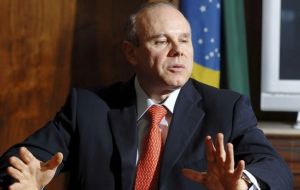MercoPress. South Atlantic News Agency
Brazil to slap tax on foreign capital inflow “to avoid speculation”
 Finance Minister Guido Mantega made the announcement Monday: the Real has gained 35% and the Bovespa index 80% since beginning of this year
Finance Minister Guido Mantega made the announcement Monday: the Real has gained 35% and the Bovespa index 80% since beginning of this year Brazil will impose a 2% tax on purchases by foreign investors of Real-denominated, fixed-income securities and on purchases of stocks. The measures are being taken “to avoid an excess speculation in the stock market and in capital markets” said Finance minister Guido Mantega told reporters Monday in Sao Paulo.
The Real has gained 35% since the beginning of the year and 5.3% in the past month. The strengthening of the Real has also pushed other Latinamerican currencies closely linked to Brazil through trade and investment.
The Brazilian central bank started purchasing dollars on May 8 in a bid to temper the Real gains. The currency weakened 0.5% to 1.7177 per U.S. dollar on Monday.
Today’s announcement reverses last year’s decision to end such taxes. In October 2008, President Lula da Silva eliminated a tax, known locally as IOF, of 1.5% on foreign investments in certain financial products and of 0.38% on foreign-currency loans.
“Excess global liquidity could lead to an over-appreciation of the Real,” Mantega said. That would threaten to hurt the country’s exporters and further fuel demand for imports. “We don’t want short-term speculation, we don’t want exaggerations”.
Mantega said the measures may not lead the Real to weaken, but are designed to slow its appreciation and prevent the creation of bubbles in Brazilian markets. “These are to prevent excesses,” he said.
Latinamerica’s biggest economy has rebounded from its first recession since 2003, powered by local demand. Industrial production expanded in the past eight months, companies resumed hiring and retail sales have returned to pre-crisis levels GDP after contracting in the last quarter of 2008 and first quarter this year, expanded 1.9% in April-June from the previous quarter.
Mantega has said the Brazilian economy can grow 5% next year.
Brazilian central bank President Henrique Meirelles said in an interview last week that emerging-market currencies that have been appreciating as economies recover from a global recession may become volatile as markets overprice assets.
Central banks need to “alert investors and markets of the risks of exaggeration in the formation of prices, which can lead to future corrections and create unnecessary volatility” Meirelles said in the interview in New York.
The Sao Paulo stock exchange, Bovespa index rose 1.9% Monday and is up 80% so far this year. Brazil’s international reserves have risen by 26.1 billion US dollars this year to 232.2 billion USD on October 16, according to data compiled by the central bank.




Top Comments
Disclaimer & comment rulesCommenting for this story is now closed.
If you have a Facebook account, become a fan and comment on our Facebook Page!